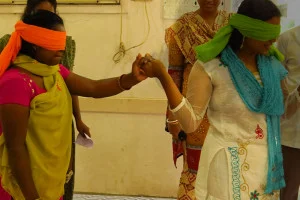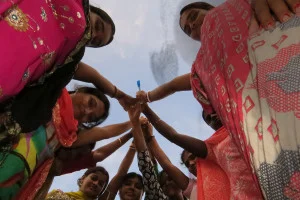On 2010
Experimentation is risky business. Trying out something new always carries with it adventure, thrill and hope – but also requires preparation and method – in laying the hypothesis, predicting results and expected changes.
Experimentation is risky business. Trying out something new always carries with it adventure, thrill and hope – but also requires preparation and method – in laying the hypothesis, predicting results and expected changes. Therefore, we require a keen eye to observe changes that were predicted and not predicted, or results that were achieved and not achieved. Of course, in social work, the challenges are set in an ever dynamic context with more variables than constants. And when we have been entrusted with public money to do this, we have to take the responsibility even more seriously.
This year (09-10) has been one of Sanjog taking on quite a few experiments – in research and in action. And each of these actions is based on partnerships and collaboration. And in the course of this process, we have found co-travelers – with whom the collaboration is not confined to purpose. As an organization, for each of us individually, the biggest conviction that drives us is the belief in engagement no matter what the risks.
So, what have the experiments that we have designed or implemented taught us? What has our experience sin the year gone by taught us about our working methods?
That change will only come when those who are most affected by the context have the opportunity to speak for themselves, and have faith in their power to change things for themselves. However, I must clarify that this is not a rich versus poor, oppressor versus oppressed worldview where I am coming from – but in order to be a part of the change, I think it is important to identify where each of the actors identify their stake in the need for change, and what changes they would like to see for themselves. And often, the one with the largest stake is the one who has the power to lead the change process.
That the strongest partnerships are those that capitalize on differences in skills, experiences and resources, rather than on commonalities and sameness. This is no new management principle or political philosophy, but failure in managing ideological differences of organizations leads to huge loss in what could be otherwise potentially rich partnership and collaborations. As an organization, we have battled with internal and external expectations of leadership – and challenged the notion that leadership and power lies with the one with clarity, direction and purpose. As an organization, we have decided that our leadership role is to foster and manage multiple truths, multiple clarities and multiple purposes, commonalities and contradictions between them as well. In India, this is particularly contextual and relevant – what is the difference between tolerating, accepting and celebrating differences? In years to come, I am excited at exploring this more in our partnerships and teams – once again, perhaps as an experiment with the objective of becoming an organization that celebrates and capitalizes on differences and diversity.
That we have learnt to accept results of experiments, of what is not working and be ready to change, to adapt. There have been times this year when it has been hard to accept such indicators, emotionally, especially by programme architects. There have been times when we felt that the programmers’ decision in accepting results of indicators and milestones must be given precedence over any ‘objective learning tool’.
At other times, we have taken hard decision and accepted failed experiments –and been transparent about it to all stakeholders – financial supporters as well as partners. Although the culture of sharing and learning between NGOs is always about sharing successes, I think we recognize the value of learning from challenges and have incorporated them in our report.
That it is important to celebrate ‘change makers’ in the movement. This year, we have met with many children and adolescents, grass root social workers and activists, who are not at the helms of political or social power, are not necessarily leaders of organizations, but are the real change-makers. They, they are often those crucial cogs in the wheel, or the nuts and bolts in organizations – who make things happen. Or they are those in a group of adolescents, who may not be the most vocal or outspoken or conspicuous, but they are the ones who internalize change, and act on them. They inspire others, they offer courage to others through example. But how does one celebrate change-makers meaningfully? We have tried out an experiment to celebrate 3 adolescent change makers – through graphic novels. We intend to continue to do this in other ways in the future.
It is not learning, but a decision we have taken – that much of Sanjog’s fundraising must happen nationally. This nation has a lot of resources. Our job would be to link people who do not have resources with people who have and are keen to share. The communication and involvement of the middle and upper middle classes in the development sector has been growing steadily – which is actually strengthening accountability of the sector as well. We are encouraged to see how many business leaders of the country are coming forward to define their CSR policies beyond and disconnected from direct business interests. We are keen to see how the linkage between Indian businesses and NGOs will grow in time to come, and how the two sectors might influence each other mutually.
That as a team, our motivations are to be guided by ‘what needs to be done in the context’ and then ‘what we are able to do’ and challenge the gaps between the two. This is a principle that motivates us at a daily level when we must play roles and perform tasks that may not come naturally to us as individuals.
Lastly, I take this opportunity to thank people who have been crucial in walking with us through this year. All the children, all social workers and all organizational leaders and our financial partners whom we have worked with and who have shared their dreams, their resources and their visions of a better world with us. And this journey would never have been without the team – ‘us’ at Sanjog.
Team Sanjog
|
Friday
,
May 14, 2015


